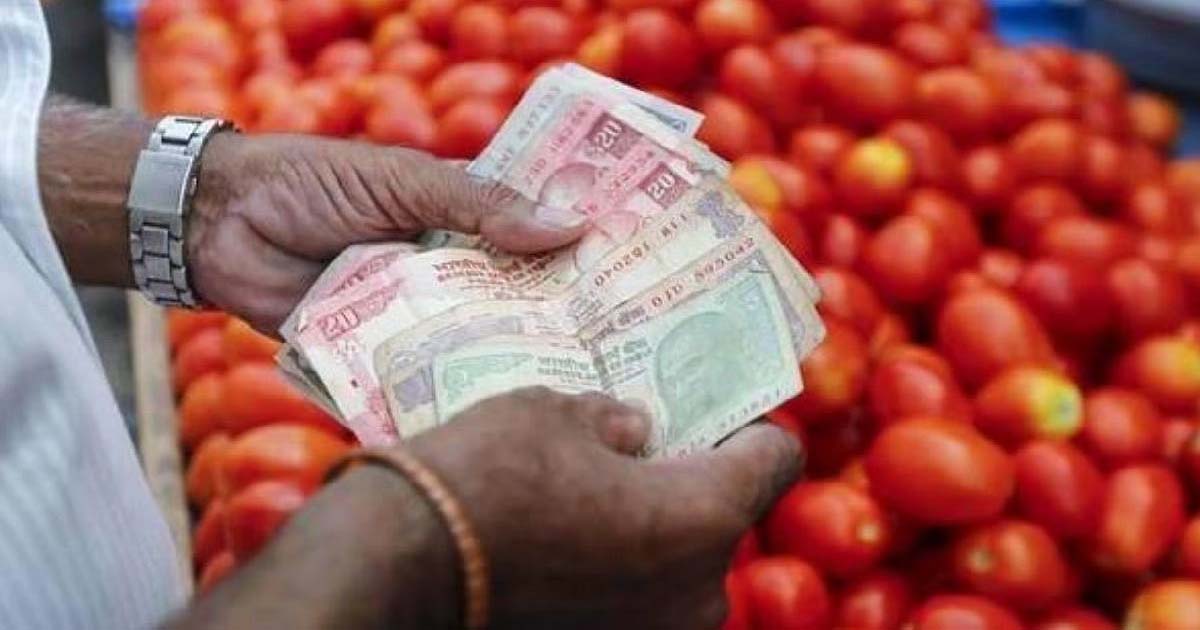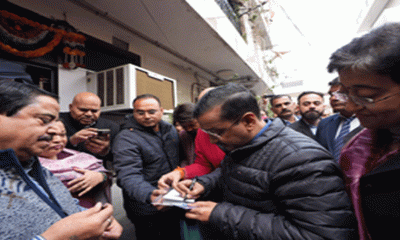National News
After Delhi, excise policy of Punjab’s AAP govt under judicial scanner
Aiming to boost revenue by reducing the price of alcohol and making the booze lovers kings, the new excise policy of the AAP government in Punjab which became operational from July 1, has come under the judicial scanner with those in the trade accusing the government of monopolising the liquor industry in favour of a “handful of entities”.
However, the government claims the policy is aimed at keeping a stringent check on the smuggling of liquor from neighbouring states and is expecting revenue generation of Rs 9,647.85 crore, a spike of about Rs 2,600 crore from the previous fiscal year.
The new policy, approved by the cabinet last month, is applicable for nine months till March 31, 2023.
The petition filed by Akash Enterprises and other wholesale and retail vendors challenged the policy in the Punjab and Haryana High Court on the plea that it is an attempt to monopolise the liquor trade. It is pending before the court.
The petitioners pleaded that the government had issued a corrigendum whereby the maximum number of retail groups that can be allotted to an entity has been increased to five from three, which furthers the intent of monopolising the liquor industry into the hands of a few ‘resourceful’ bidders.
Contrary to the allegations, a spokesperson for the Chief Minister’s Office told IANS that the new excise policy aims to break the mafia nexus in the liquor trade.
Joining issue, rebel AAP leader and now Congress legislator Sukhpal Singh Khaira said since Arvind Kejriwal has replicated the Delhi excise policy in Punjab by putting the liquor trade into the hands of the mafia and has robbed small contractors of their livelihood, there should be a similar CBI probe ordered against this policy in Punjab to bring out the truth.
“It is an irony that while Kejriwal is crying wolf in Delhi and issuing clean chits to his ministers accused of corruption with irrefutable evidence, his government in Punjab is orchestrating a malicious and vengeful vendetta campaign in the state against political opponents on baseless allegations of corruption,” he said.
For consumers it has brought cheers with the reduction in the price.
The duties levied on liquor in the wholesale trade have been slashed by 25-60 per cent.
Also in the new policy no quota has been fixed for the sale of Indian made foreign liquor (IMFL) and beer, which means vend owners can sell as much liquor as they can.
Trade insiders told IANS the policy has reduced the number of groups or clusters of liquor vends from about 750 in the last financial year to 177, with the aim to increase control over the liquor trade and tap optimum revenue.
Als, the government gave its nod to allot two special battalions of police to the excise department, in addition to the existing force, for keeping an effective vigil over the excise duty pilferage.
To encourage investment, a provision for a new distillery and brewery licence has been made in the policy for the production of malt spirit which has been done to encourage crop diversification and provide better remuneration to the farmers.
A government official familiar with the matter told IANS earlier that it was the liberal liquor policy of Chandigarh that was hitting neighbouring states the most, including Punjab.
The chief ministers of Punjab, Haryana and Himachal Pradesh on several occasions had requested the Chandigarh administration to fix a quota for licensees and increase levies as these have been causing an annual revenue loss of Rs 200-Rs 300 crore to them owing to liquor smuggling.
They had argued that allocation of unlimited quota to a licencee in Chandigarh was promoting smuggling of liquor to nearby states.
“Now it is the liberal liquor policy of Punjab that is going to hit neighbouring states the most,” added the official.
In Punjab, alcohol is the maximally abused substance by more than two million people, followed by tobacco which is consumed by more than 1.5 million people, finds the latest study by the Chandigarh-based Postgraduate Institute of Medical Education and Research (PGIMER).
The abuse of opioids is by 1.7 lakh individuals, followed by cannabinoids as well as sedative-inhalant stimulants. The latter are largely a class of pharmacological or prescription drugs being used illicitly.
As per the State of Punjab Household Survey and statewide NCD STEPs Survey by the PGIMER, the projected number of overall substance use in Punjab is 15.4 per cent.
Coming out in support of the new liquor policy, Finance Minister Harpal Singh Cheema said the government has targeted to generate Rs 9,600 crore as against Rs 6,200 crore in the last fiscal.
He said earlier liquor purchased from Haryana used to be sold in Punjab. “The days of the liquor mafia are over now,” he added.
Responding to Delhi’s lieutenant governor V.K. Saxena asking the Central Bureau of Investigation (CBI) to inquire into the Delhi government’s excise policy, BJP national general secretary Tarun Chugh said the AAP government’s links with the liquor cartel would soon be exposed in Punjab too.
In Punjab also Kejriwal has tried to replicate the Delhi model which would soon be exposed, he added.
Crime
Mumbai Customs Foils Smuggling Attempt, Seizes ₹14 Crore Worth Of Hydro Ganja At CSMIA

The Mumbai Customs Department has seized 14 crore rupees worth of hydro ganja and smuggled gold in five separate operations at Chhatrapati Shivaji Maharaj International Airport between November 6 and 9. Officials from Zone 3 of the Customs Department carried out the operations, which led to the arrest of multiple passengers arriving from Bangkok, Phuket, and Nairobi.
The first seizure took place on November 6, when a passenger arriving from Bangkok was found carrying 2.87 kilograms of hydroponic cannabis valued at Rs 2.87 crore. The next day, two more passengers flying in from Phuket were caught with nearly 4 kilograms of hydro cannabis, worth approximately Rs 4.2 crore.
On November 8, Customs officials intercepted more passengers arriving from Bangkok and Nairobi, recovering additional hydro cannabis and smuggled 22-carat gold bars weighing 358 grams. The estimated value of the gold is Rs 3.7 lakh.
In total, 13 kilograms and 84 grams of hydro ganja and 358 grams of gold were confiscated over three days. Customs officials stated that strict surveillance measures are being maintained at the airport, and all attempts to smuggle narcotics or gold will be firmly dealt with.
Hydroponic cannabis, often called hydro cannabis, is grown without soil using a nutrient-rich water solution. Common in Thailand, this method enables cultivators to precisely control growing conditions, resulting in faster growth and higher yields. These plants are usually grown indoors under LED or HPS lights, with regulated temperature, humidity, and nutrients. The increasing production of hydro cannabis in Thailand has led to rising smuggling attempts into India.
National News
‘Shameless’: BJP on Congress ‘politicising’ Delhi blast

New Delhi, Nov 11: A day after the terror attack near Delhi’s Red Fort, the BJP on Tuesday hit out at the “shameless” Congress for “working against national interest”, deprecating the Opposition parties’ bid to “politicise” the tragedy in which eight people were killed.
“If being shameless and working against national interest had a face, it would look exactly like the Congress,” said BJP leader Amit Malviya.
“The problem with our Opposition and the loony far-Left ecosystem is that they simply do not know how to stand with the country in times of need,” said Malviya, incharge of BJP’s National Information and Technology Department, on X.
“Soon after Pahalgam, they whined endlessly, demanding retribution. But the moment Operation Sindoor crushed terror networks, they began croaking for ‘peace’ – some even discovering newfound ancestral ties to Pakistan,” said the BJP leader.
“And now, instead of standing with India, they’re busy politicising the Delhi blast, questioning the government even as evidence points to a massive crackdown that has busted several terror modules, averted major strikes, and led to the arrest of dreaded operatives. Our intelligence agencies are hot on their heels,” he said.
Malviya said, “While top government functionaries are monitoring the situation closely and reassuring the nation, the Leader of Opposition and his sister, the second-in-command in Congress, are reportedly on yet another foreign leisure trip.”
The BJP leader’s stinging criticism of the Congress and its allies coincided with Prime Minister Narendra Modi, who, while speaking in Bhutan, assured action against the conspirators behind the blast.
He stated that Indian agencies will get to the bottom of the conspiracy and assured that those behind the blast “will not be spared”.
In his remarks at Changlimethang Ground in Thimphu, PM Modi said that India and Bhutan have shared a deep spiritual and cultural bond for centuries.
He said, “Today is a very important day for Bhutan, for the Bhutanese royal family, and for all who believe in world peace. India and Bhutan have shared a deep spiritual and cultural bond for centuries. And therefore, it was India’s and my commitment to participate in this important occasion.”
“Today, I come here with a very heavy heart. The horrific incident that took place in Delhi yesterday evening has deeply saddened everyone. I understand the grief of the affected families. Today, the entire nation stands with them. I was in touch with all the agencies investigating this incident throughout last night… Our agencies will get to the bottom of this conspiracy. The conspirators behind this will not be spared. All those responsible will be brought to justice,” he added.
Union Home Minister Amit Shah also chaired a meeting at his residence with top officials regarding the car blast near Red Fort Metro Station.
Business
Tomato Prices In Mumbai Surge – Know What Are The Current Rates

Navi Mumbai: The APMC wholesale vegetable market saw an increase in tomato prices by over 30 percent in first week of November as compared to the prices in October 2025. According to the report, prices of tomatoes in October were sold in APMC at Rs 16 -20 per kg and have now increased to Rs 20-28 per Kg.
The supply of tomatoes have also reduced on Monday, as report by Loksatta stated that only 2238 quintals of tomatoes arrived in the APMC Market.
According to the report, traders said that cold weather and imbalance production of tomatoes led to the increase in price, adding that in the last few days, the supply of goods from Nashik, Pune and Nagar areas also reduced.
According to the report, farmers have cautioned about crop damage caused by unseasonal rainfall and the current cold weather, stating that there is a significant chance that the produced crop’s flowers and buds will fall.
Several other reports added that the price of green peas, cluster beans have also gone up. Price of green peas increased to Rs 280 per kg, cluster beans reached Rs 200 per kg while that of Tinda (Indian round gourd) have rised to Rs 50 for 250 grams.
According to Regional Meteorological Center,Mumbai, the climate in Pune, Nashik is expected to see dry climate till November 15. Indian Meteorological Department (IMD) Mumbai scientist Shubhangi Bhute added that, “there are no signs of unseasonal rainfall currently. With the northeasterly winds prevailing, the temperature will drop. The weather will be dry and skies will be clear.”
-

 Crime3 years ago
Crime3 years agoClass 10 student jumps to death in Jaipur
-

 Maharashtra1 year ago
Maharashtra1 year agoMumbai Local Train Update: Central Railway’s New Timetable Comes Into Effect; Check Full List Of Revised Timings & Stations
-

 Maharashtra1 year ago
Maharashtra1 year agoMumbai To Go Toll-Free Tonight! Maharashtra Govt Announces Complete Toll Waiver For Light Motor Vehicles At All 5 Entry Points Of City
-

 Maharashtra1 year ago
Maharashtra1 year agoFalse photo of Imtiaz Jaleel’s rally, exposing the fooling conspiracy
-

 National News1 year ago
National News1 year agoMinistry of Railways rolls out Special Drive 4.0 with focus on digitisation, cleanliness, inclusiveness and grievance redressal
-

 Maharashtra12 months ago
Maharashtra12 months agoMaharashtra Elections 2024: Mumbai Metro & BEST Services Extended Till Midnight On Voting Day
-

 National News1 year ago
National News1 year agoJ&K: 4 Jawans Killed, 28 Injured After Bus Carrying BSF Personnel For Poll Duty Falls Into Gorge In Budgam; Terrifying Visuals Surface
-

 Crime1 year ago
Crime1 year agoBaba Siddique Murder: Mumbai Police Unable To Get Lawrence Bishnoi Custody Due To Home Ministry Order, Says Report






















